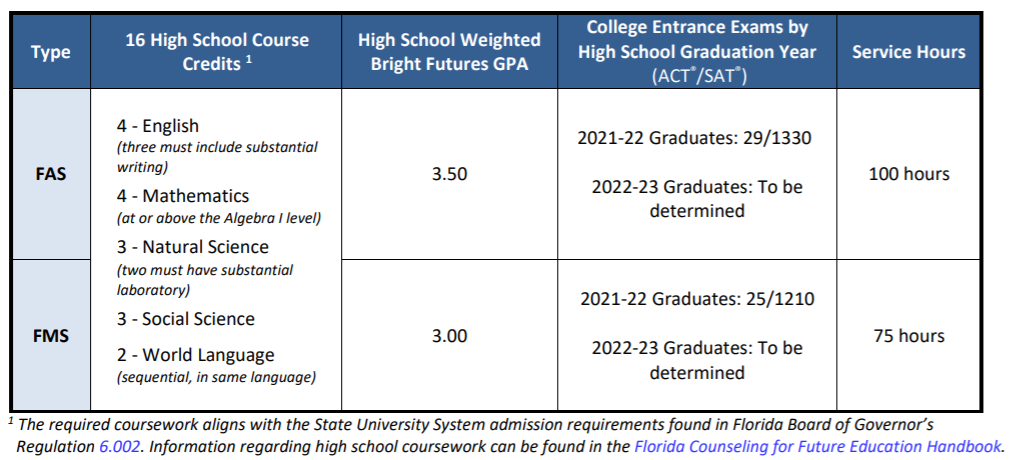In Florida, the Bright Futures Scholarship serves as a beacon of opportunity for thousands of deserving students. Surprisingly, this initiative has helped over 800,000 students since its inception, underscoring the significant impact of its financial aid. The importance of meeting its rigorous requirements, however, cannot be overstated, as they play a crucial role in determining eligibility and setting a standard for academic achievement.
The criteria for the Bright Futures Scholarship are meticulously outlined to ensure consistency and fairness. Students are evaluated based on academic performance and standardized test scores, which forms the crux of the qualification process. Since its launch, the scholarship has remarkably contributed to increasing the educational attainment rate in Florida, providing an enduring solution to rising tuition costs. Such requirements not only help streamline the selection process but also drive students toward a focused and earnest academic path.

Bright Futures Scholarship Requirements Overview
The Bright Futures Scholarship is a program that helps Florida students attend college. It requires students to meet certain criteria, which focus on academics, service hours, and test scores. This scholarship aims to reward students who have demonstrated excellence in high school and wish to pursue higher education. Meeting these requirements can make college more affordable, which is a significant benefit for many families. To learn more about the specific criteria.
Academically, students need to achieve a specific grade point average (GPA) to qualify. The GPA requirement varies depending on the specific Bright Futures program, each tailored to different levels of student achievement. For instance, the Florida Academic Scholars Award has higher GPA requirements compared to other levels. In addition to this, maintaining good grades throughout high school is essential for eligibility. This promotes consistent academic effort and discipline among students.
Another key component is completing a set number of community service hours. This aspect of the scholarship ensures that students give back to their communities and develop civic responsibility. Engaging in community service not only meets the scholarship requirement but also helps students gain valuable skills and experience. This opportunity allows students to contribute positively while preparing for future leadership roles. According to this post, volunteering can also broaden a student’s perspective.
The scholarship also considers scores from standardized tests like the SAT or ACT. These scores must meet a minimum threshold to qualify for the scholarship, and they play a vital role in evaluating a student’s readiness for college-level work. Students often take these exams multiple times to improve their scores and enhance their scholarship eligibility. Preparing for these tests can impact the scholarship outlook significantly. This strategic approach helps students maximize their chances of receiving financial aid.
Highlights of the Eligibility Criteria
The Bright Futures Scholarship has specific eligibility criteria that students must meet. Firstly, students are required to maintain a competitive GPA throughout high school. This ensures that only students who are dedicated to their academics are considered. Additionally, students need to complete a certain number of community service hours. This aspect of the criteria encourages students to engage with and contribute to their communities.
Standardized test scores are another crucial aspect of the eligibility criteria. Students must achieve a minimum score on the SAT or ACT to qualify for the scholarship program. This requirement highlights the importance of preparing and performing well on these tests. By setting a benchmark, the scholarship ensures that students are equipped for college-level studies. Consistent preparation and practice can help students meet this criterion effectively.
Different levels of the Bright Futures Scholarship, like the Florida Academic Scholars and the Florida Medallion Scholars, have varying requirements. Each level demands different GPA and test score minimums, giving students options based on their performance. Here is a simple table to illustrate these requirements:
| Scholarship Level | GPA Requirement | Test Score Requirement |
|---|---|---|
| Florida Academic Scholars | 3.5 | 29 ACT / 1330 SAT |
| Florida Medallion Scholars | 3.0 | 25 ACT / 1210 SAT |
Furthermore, students must be residents of Florida, applying to or attending eligible institutions within the state. This residency requirement ensures that the scholarship benefits Florida’s own students. The scholarship is primarily funded by the state, aiming to support local students in achieving higher education goals. By fulfilling all the criteria, students not only gain financial aid but also recognition for their hard work. This is what makes the Bright Futures Scholarship a prestigious award.
Detailed Understanding of the Academic Requirements
The Bright Futures Scholarship places a significant emphasis on academic requirements. Students need to focus on maintaining a solid GPA throughout their high school years. This generally means consistently scoring well in all subjects. High academic performance is a key factor that this scholarship considers. It’s essential to monitor grades regularly and seek help when needed to ensure eligibility.
Course selection is another critical aspect that students must consider. Certain core courses are required, such as English, Mathematics, and Science. These core subjects help prepare students for the academic rigor of college. To meet the scholarship guidelines, it is important to ensure these courses are part of the academic plan. Consulting academic counselors can aid in making informed decisions about course selections.
For a better understanding, here’s a simple list of some required courses for eligibility:
- 4 credits in English.
- 4 credits in Mathematics (including Algebra I).
- 3 credits in Natural Science (2 must have lab components).
- 3 credits in Social Science.
- 2 credits in a World Language (sequential, same language).
Lastly, the academic requirements urge students to maintain regular attendance and demonstrate commitment. Missing classes frequently can affect grades and overall understanding of the curriculum. Schools may have additional policies that support the scholarship’s criteria, so staying informed is beneficial. Being proactive and engaged in school goes a long way in fulfilling these academic obligations. Together, these factors shape the foundation for a successful scholarship application.
Exploring the Service Hours Required for Bright Futures Scholarship
Community service hours are a vital component of the Bright Futures Scholarship. This requirement encourages students to engage with their communities and develop empathy for others. By participating in various service activities, students can gain valuable life experiences. These hours must be completed through non-profit organizations, schools, or community programs. Such involvement not only fulfills the scholarship criteria but also fosters personal growth.
A typical requirement for these service hours varies based on the type of Bright Futures Scholarship a student is pursuing. Generally, the Florida Academic Scholars Award demands more hours than the Florida Medallion Scholars Award. For better clarity, let’s look at a simple table:
| Scholarship Level | Service Hours Required |
|---|---|
| Florida Academic Scholars | 100 hours |
| Florida Medallion Scholars | 75 hours |
It is crucial to choose service activities that align with a student’s interests and strengths. This makes the experience more enjoyable and meaningful. Students should consider their passions and find opportunities that match. Whether it’s tutoring, assisting at animal shelters, or helping with community clean-ups, the options are endless. Keeping a detailed log of the hours worked is essential for validation.
Volunteering not only fulfills this requirement but enriches a student’s understanding of the world. It provides a platform for students to use their skills to improve their surroundings. This active participation builds leadership qualities. Making a difference in the community is rewarding on many levels. Planning ahead ensures students have ample time to complete these hours before graduation.
Parents and educators play a significant role in guiding students to suitable volunteering opportunities. They can help identify safe and legitimate non-profits for students to work with. Networking within community groups also provides additional options. Collaboration between students, parents, and schools ensures a balanced and rewarding volunteer experience. Making volunteering a priority can enhance a student’s school life and resume.
Importance of the Standardized Test Scores in the Eligibility Process
Standardized test scores are a critical element in the eligibility process for the Bright Futures Scholarship. These scores help assess whether students are prepared for college-level work. Tests like the SAT and ACT provide a consistent measure of students’ academic abilities. Achieving the required test scores can significantly increase a student’s chances of receiving the scholarship. This makes preparation for these exams extremely important.
Students have multiple opportunities to take these tests and improve their scores. Many students start by taking practice tests to identify areas that need improvement. Regular preparation can lead to better scores over time. Schools often offer resources or prep classes to help students succeed. With dedication and focus, students can work to meet the required benchmarks.
The scholarship requirements include specific score thresholds for different levels of awards. Here’s a breakdown of what’s typically required:
| Scholarship Level | SAT Score | ACT Score |
|---|---|---|
| Florida Academic Scholars | 1330 | 29 |
| Florida Medallion Scholars | 1210 | 25 |
Preparing for these standardized tests also builds important skills like critical thinking and time management. These skills not only benefit the test-taking process but also further student education. The experience of preparing for and taking these tests readies students for future academic challenges. Engaging with the material and practicing regularly can ease test anxiety and improve confidence. Doing well on these tests sets a positive tone for a student’s educational journey.
Parents, teachers, and counselors can support students by providing test strategies and encouraging consistent practice. They can help students find the best study materials and resources. Additionally, discussing past challenges and setting realistic goals can motivate students. Support systems play a crucial role in student success on these standardized exams. With the right mindset and preparation, students can turn test scores into a gateway for their future opportunities.

